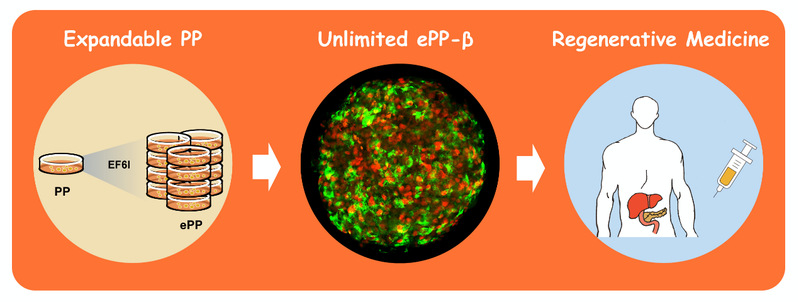On February 23, 2022, Saiyong Zhu’s Lab at Life Sciences Institute, Zhejiang University, published a research article in Science Advances entitled “Human expandable pancreatic progenitor-derived β cells ameliorate diabetes”.

FIG 1. A new system for efficient expansion of human pancreatic epithelial cells and its clinical transformation
Diabetes is a high incidence of chronic diseases worldwide, which seriously affects the health of hundreds of millions of people. And an unlimited source of human pancreatic β cells is in high demand. Even with recent advances in pancreatic differentiation from human pluripotent stem cells, major hurdles remain in large-scale and cost-effective production of functional β cells. Here, through chemical screening, Zhu’s lab demonstrates that the bromodomain and extraterminal domain (BET) inhibitor I-BET151 can robustly promote the expansion of PDX1+NKX6.1+ pancreatic progenitors (PPs). These expandable PPs (ePPs) maintain pancreatic progenitor cell status in the long term and can efficiently differentiate into functional pancreatic β (ePP-β) cells. Notably, transplantation of ePP-β cells rapidly ameliorated diabetes in mice, suggesting strong potential for cell replacement therapy. Mechanistically, I-BET151 activates Notch signaling and promotes the expression of key PP-associated genes, underscoring the importance of epigenetic and transcriptional modulations for lineage-specific progenitor self-renewal.
In summary, their studies achieve the long-term goal of robust expansion of PPs and represent a substantial step toward unlimited supplies of functional β cells for biomedical research and regenerative medicine.
Dr. Xiaojie Ma is the first author in this study. Dr. Saiyong Zhu is the corresponding author. This work was supported by grants from the National Natural Science Foundation of China, the National Key Research and Development Program of China, the Outstanding Youth Fund of Zhejiang Province, and the Fellowship of China Postdoctoral Science Foundation.
Link:https://www.science.org/doi/10.1126/sciadv.abk1826



